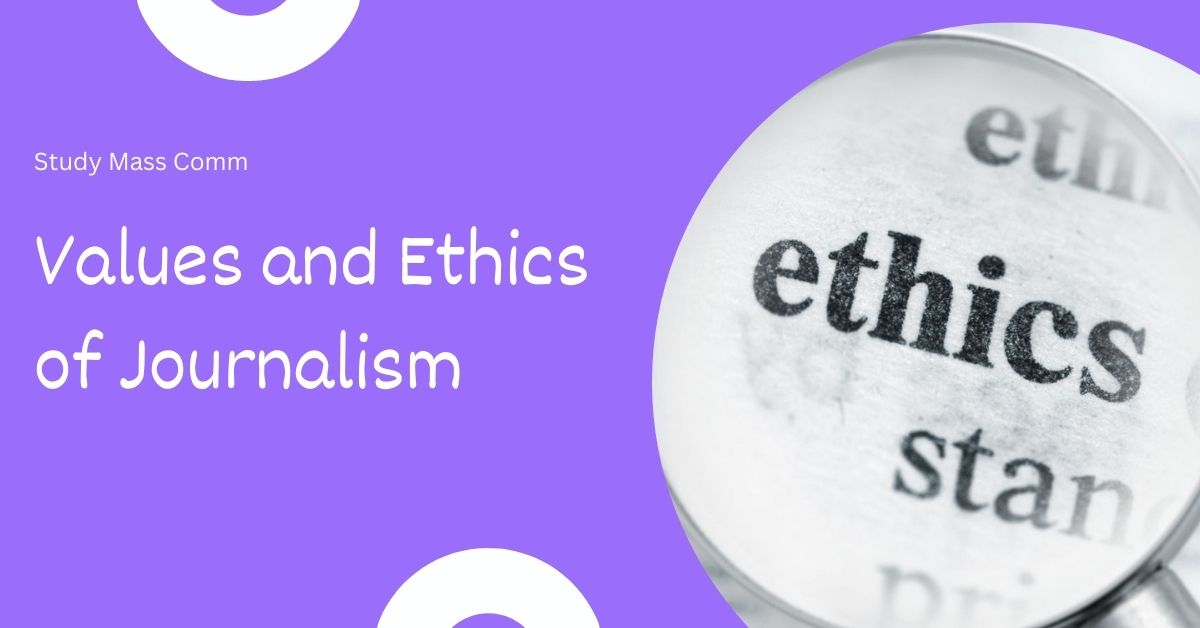Law is imposed on journalists by the government of a nation similar to how it is imposed on all the citizens of the nation. Laws like defamation, contempt of court, contempt of parliament exist to check the excesses and errors of the journalists.
Principles of Journalism deal with how news should be received from various sources and reported. Ethics are the moral principles involved in news reporting and coverage.
A journalist needs to have certain moral principles to be followed in his/her profession which could be termed as ‘professional ethics’. Ethics could not be forced on any one but each profession carry a ‘Code of Conduct’ to be seen as rules of practice. Ethical guidelines are peculiar to each profession and are designed to prevent abuse and unrestrained use of the powers and privileges of that profession. Many Newspapers in India have formulated their own code of ethics for their employees to follow.
Those are the days when journalism was considered to be an idealistic profession and pen’s mightiness over sword was well maintained. Now the journalist as well as the society has accepted that journalism is just another profession and media organizations are considers being business ventures that compete with each other to win the race and be ahead in ratings. The rising popularity of electronic media and their giving utmost importance to entertainment aspect has paved the way for this sort of unhealthy competition. Even in such a scenario, some basic ethical considerations need to be kept in mind by the journalists.
Objectivity
A newspaper or channel might be having affiliation towards a particular political party or a business group. But, in news reporting, such priorities of the media organizations should not get reflected. Also, the reporter of a news item should also be careful that his individualistic opinions should not be part of the report. News and Views need to be always separate to maintain objectivity by the journalists. When public interest and the interest of a particular media organization may not go hand in hand in certain instances, priority needs to be given to the public interest and not business interests.
Sincerity, Truthfulness, Accuracy
Good faith with the reader is the foundation of all journalism worthy of the name. By every consideration of good faith a newspaper is constrained to be truthful. It is not to be excused for lack of thoroughness or accuracy within its control, or failure to obtain command of these essential qualities.
Decency
Journalists also have moral responsibility in using the words and illustrations they use. In news reporting, especially stories on as fire, accident or sex the decision over what details to include involves more than just newsworthiness. The reporting should not show or promote violence and obscenity. Obligation to protect moral of children should also be remembered. Journalist should use the words or illustrations which are decent for the society and are of good taste.
Impartiality
Sound practice makes clear distinction between news reports and expression of opinion. News reports should be free from opinion or basics of any kind. This rules does not apply to so-called special articles unmistakably devoted to advocacy or characterized by a signature authorizing own conclusion and interpretation of the writer. News Reporting should balance with presentation of every side involved.
Crass commercialism
The practice of cut-throat commercial competition with rivals with sole aim to make money/profit without any consideration of how it affects others is known as Crass Commercialism. All the media organizations are entitled to make profit, but making money should not be sole objective of media organizations. They should not practice unfair means to earn more profits. They should not be involved in Crass commercialism, including in unfair practices like obscene scenes, pictures and writings. That such portrayal would spoil the mind of the young stars and children should be kept in mind by the media.
Sensationalism
Sensationalizing the events/ happenings needs to be avoided by an ethical journalist. Basically in the time of communal clashes and disasters, there is a rush and anxiety among the people to know the latest news. Instead of cashing on such expectations, media should see that the reporting is done in such a way that it would not aggravate the clashes or create unnecessary fear in minds of the people about a disaster.
To become a skilled journalist, mastering the essential qualities of a reporter is crucial. For insights, explore the article on the qualities of a reporter.
Privacy
Privacy of any individual can be invaded physically by sticking a microphone into someone’s face, or it may be publishing embarrassing personal information. But Publication or broadcasting of information, including pictures, about the private lives or concerns of individuals without consent should be avoided. However, this is acceptable only if a serious legitimate public interest outweighs their normal human right of privacy or where the material concerned ought to be published in the public interest which outweighs the normal human right of privacy. Also Sources are needed for breaking news but at the same time their privacy also should be respected and safeguarded and should not be taken for granted by media.
Obscenity
Obscenity can be defined as any work that appeals predominantly to prurient interest or any work that depicts or describes secual conduct in patently offensive way. Obscenity is referred to indecent expressions, such as words, images and actions. Extreme care must be taken by journalists that obscene word and depiction are avoided specially while reporting crime and involving women.
Source: Odisha State Open University




